10 Jun2019
By Ward Cummings
It was another successful Washington Week as AACTE members, students, and partners descended on the nation’s capital to network, advocate, and augment the 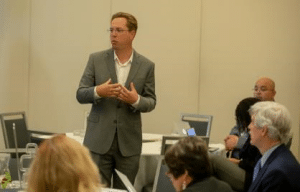 capacity of the profession at the table. There was something for everyone—whether they were attending Washington Week for the first time or were a perennial attendee.
capacity of the profession at the table. There was something for everyone—whether they were attending Washington Week for the first time or were a perennial attendee.
Three signature events comprise AACTE’s Washington Week: the State Leaders Institute (June 2-3), the Holmes Doctoral Scholar Summer Policy Institute (June 3), and Day on the Hill (June 4-5). Kim Metcalf, chair of the AACTE Board of Directors, and Michael Maher, chair of the AACTE Advisory Council of State Chapters, kicked off the week of events opening the State Leaders Institute (SLI).
Focusing on building the capacity of the state chapter and its leadership, SLI attendees learned about the impact of their state’s political dynamics on the development and advancement of education policy. Diving into the challenges of chapter leadership, SLI sessions included the development of sustainable leadership pipelines and the recruitment and retention of chapter membership. Conversations and sessions covered ideas and practices on a host of important issues of interest to AACTE members, including how to attract more teachers to the profession, how to use social media to augment the presence and voice of the chapter and its membership, and how to employ the power of grants to meet state and regional chapter goals.
03 Jun2019
By Jerrica Thurman
Are you following what’s happening at AACTE’s Washington Week on Facebook and Twitter at #AACTEWW19? Tune into the daily Facebook Live Shows on the AACTE Facebook page and hear in real time what attendees have to say about the key signature events, session topics, networking, and pressing issues in educator preparation. You can watch these videos of the Facebook Live Shows from the past two days of the event:
Sunday, June 2
Monday, June 3
20 May2019
By Jane E. West
This blog post is written by AACTE consultant Jane West and is intended to provide update information. The views expressed in this post do not necessarily reflect the views of AACTE.
Today marks the 65th Anniversary of the Brown vs. Board of Education Supreme Court landmark decision that established the principle that separate is not equal. How far have we come? Much to contemplate here. You will see below that a House education panel spoke loud and clear on that topic: we have a long way to go.
- Trump Proposes Taking More Funds from Pell Grants – to Fund Moonshot? Huh?
This week President Trump submitted to Congress some revisions to his original budget request. Notably, he took back the proposed cut he originally made for Special Olympics (after great bipartisan outrage); but he also added a new cut in the form of an additional $1.9 billion to the Pell grant surplus. It appears that the Pell cut would go toward funding the President’s proposed 2024 NASA moonshot! Education advocates were outraged. As Jon Fansmith of the American Council on Education put it: “Do I want to make college more expensive to fund space travel to the moon and Mars?” Hmmmm …
The President had already requested a $2 billion cut in Pell funding. So the total $3.9 billion recission would result in the Pell surplus being exhausted by 2022! This request is likely to be ignored on Capitol Hill, as no one—Republican or Democrat—ever really contemplated cutting Special Olympics. And while the Pell Surplus has been modestly raided in the past, a $3.9 billion cut is highly unlikely.
12 May2019
By Jerrica Thurman
Are you following highlights of the AACTE 2019 Washington Week on Facebook and Twitter at #AACTEWW19? In addition to blog posts and video highlights, AACTE recently released a Washington Week infographic on social media. Check it out below!
12 May2019
By Deborah Koolbeck
May has the Congress working hard! The U.S. House of Representatives (House) is moving forward at an intense pace on the 12 appropriations bills, moving the Labor, Health & Human Services, Education, and Related Agencies bill through the full committee first.
What are the funding levels for programs important for the profession? Where are the House and the U.S. Senate on reauthorization of the Higher Education Act? What else is unfolding that could impact the profession? These topics and more will be covered in the AACTE member exclusive May 2019 Federal Update webinar, offered on two different days and at different times of the day to accommodate member schedules. A recording of the webinar and the slides will be posted on the AACTE Advocacy Center’s federal page.
Register for the webinar that fits your schedule:
May 21, 2019 5:00 – 6:00 p.m. EDT
Registration Link
May 22, 2019 11 a.m. – 12 noon EDT
Registration Link
12 May2019
By Jane E. West
This blog post is written by AACTE consultant Jane West and is intended to provide update information. The views expressed in this post do not necessarily reflect the views of AACTE.
I’m downright excited to have some GREAT news to report from Washington! Some of our leaders want to increase the federal INVESTMENT in public education! Hallelujah.
- House Moves Expansive Education Funding Bill through 8 Hour Marathon Mark up
This week Chair of the House Subcommittee on Labor/HHS/Education Rosa DeLauro (D-CT) successfully moved her spending bill out of the full Appropriations Committee. The bill retains its overall 6% increase for education from last fiscal year, bringing the Department of Education to $75.9 Billion, and features significant increases for key education programs.
08 May2019
By Allen Clarkson
Summer is a time when most educators are thinking about taking a break from the demands of the academic year and focusing their attention on matters outside of the classroom. That makes summer the perfect time for educators to reach out to the institutions off-campus that impact their work as teachers, including legislators, regulators, and colleagues at other academic institutions.
We must never lose sight of the fact that educator preparation is held accountable at the state level and that graduates of teacher programs move into the PK-12 system—which itself is predominantly funded and certainly accountable at the state and local level. For these reasons, it is key to engage with the state agencies, commissions, and other entities that comprise your state’s educator preparation accountability system.
We want to help you.
The AACTE Government Relations and Advocacy Committee is hosting a webinar on Wednesday, May 16 at 11:00 a.m., specifically designed to help educate educators on the procedures and practice of summertime advocacy.
06 May2019
By Linda Minor
Last week, Deborah Koolbeck, Brandon Frost, and I went to the Renaissance Arlington Capital View Hotel to get familiar with the venue and surrounding area where Washington Week will take place June 2-5. Although it was raining that day, we decided to walk from the Crystal City Metro stop to the hotel—about a 10 minute walk. There is an underground walkway with numerous shops and restaurants, but we enjoyed the outdoor walk and getting acclimated to the area.
06 May2019
By AACTE
On behalf of the Board of Directors of the American Association of Colleges for Teacher Education (AACTE), President and CEO Lynn M. Gangone issued the following statement today responding to the passage of HB 7093 through the Florida legislature:
“While it is in the purview of states to determine paths forward on school safety that protect students and teachers, the passage of this particular bill in Florida is disconcerting at best.
In particular, after Parkland, Florida enacted a law that created an optional program to have armed ‘guardians’ on school campuses, but explicitly prohibited teachers engaged in classroom instruction from being a guardian, with limited, focused exceptions. HB 7093 eliminates this prohibition, opening the door for classroom teachers to be armed. Expanding what was already a controversial policy is the wrong path toward ensuring the safety of all students and staff on school campuses.
29 Apr2019
By Linda Minor
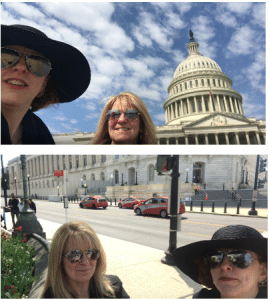
Being new to AACTE, I learned a lot about what to expect during Day on the Hill when Deborah Koolbeck and I recently went to the Capitol. I have never been on the Capitol grounds before, although I have lived in the DC area for over 20 years, and it is beautiful. The weather was perfect. View video clip about Capitol Grounds.
So, what can you expect during Day on the Hill? Tuesday will be a full-day of orientation at the hotel where you will build skills and prepare for their meetings with your congressional offices. Then, on Wednesday morning you will be bused to Capitol Hill for scheduled appointments with your elected officials. “But what about their luggage,” I asked? Attendees can bring luggage on the bus to the hill—or you can stay in town a little longer and take advantage of all the activities DC has to offer. View video clip about luggage.
29 Apr2019
By Ward Cummings
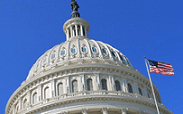 In anticipation of Washington Week’s Day on the Hill, AACTE’s premier advocacy event, members of the Committee on Government Relations and Advocacy hosted a webinar on Thursday, April 18 to answer questions about the event. How to schedule a congressional meeting, how to develop an advocacy message, and how to walk into a U.S. Senator’s office with confidence, are just samples of the many issues discussed during the webinar. The recorded webinar, Are You Ready for a Day on the Hill? is now available to watch on the AACTE website.
In anticipation of Washington Week’s Day on the Hill, AACTE’s premier advocacy event, members of the Committee on Government Relations and Advocacy hosted a webinar on Thursday, April 18 to answer questions about the event. How to schedule a congressional meeting, how to develop an advocacy message, and how to walk into a U.S. Senator’s office with confidence, are just samples of the many issues discussed during the webinar. The recorded webinar, Are You Ready for a Day on the Hill? is now available to watch on the AACTE website.
During the webinar, an experienced panel of experts shared their personal stories and provided guidance on the methods and reasons for advocacy. Additionally, they explained what attendees at this year’s Washington Week in the nation’s capital can expect when they attend Day on the Hill events.
Webinar attendees were instructed on what things to arrange prior to traveling, who to involve from their institution, how to request an appointment with their legislator, and how to prepare for the meeting. It was a one-stop-shop for all things related to the event.
29 Apr2019
By Michael Maher

What does it mean to be a leader? Are leaders born or are they developed?
If you Google the word “Leader,” depending on the day, you may end up with between 4 and 6 billion hits. There is certainly no shortage of opinions, courses, or books on leadership. Some individuals are leaders by virtue of their title, others are considered leaders whether or not they have a title. Whether leadership has been thrust upon you or it has slowly developed over time, you understand that leadership carries the challenge of expectations and obligations.
As a person who thinks about the concept of leadership quite a bit, it seems to me that, although some individuals may embody characteristics that lend themselves to leadership, true leaders are developed over time through a combination of professional development and lived experience.
As a leader you have an obligation to those you lead, an obligation to the profession, and an obligation to yourself. In the field of education, and in teacher preparation in particular, there are no shortage of leaders. Those who are the most impactful, however, are the ones who continuously seek to improve their knowledge, skills, and relationships.
12 Apr2019
By Denise Pearson

Historically black colleges and universities (HBCUs) and other minority-serving institutions (MSIs) are uniquely positioned to engage higher education policymakers, researchers, practitioners, and other stakeholders to increase the participation of males of color throughout the teacher pipeline. To that end, Project Pipeline Repair: Restoring Minority Male Participation and Persistence in Educator Preparation Programs is a three-year, research-based initiative that emphasizes cross-sector collaboration as foundational to addressing three interconnected problems: nationwide teacher shortages, the lack of teacher diversity, and the teaching profession narrative.
On October 2-5, 2019, the State Higher Education Executive Officers Association (SHEEO) will host the Project Pipeline Repair Summit that will bring together P-16 policy, institutional, and community leaders to culminate this collaboration between state agencies, HBCUs, and partnering school districts in four states (Arkansas, Louisiana, Mississippi, and South Carolina). During the Summit, we will engage in deep conversations with higher education policy and practice experts, including educator preparation researchers and practitioners. Representatives from other MSIs and organizations with similar aims are welcomed, and will also be present to expand the learning and build capacity in these important policy and practice areas.
12 Apr2019
By Jane E. West
This blog post is written by AACTE consultant Jane West and is intended to provide update information. The views expressed in this post do not necessarily reflect the views of AACTE.
Congress was busy this week trying to wrap a few things up as they enter an extended recess period. With the timeline for the election pressing, the momentum will continue. Remember the first Democratic presidential candidate debate is in June—just two months away! So the pressure is on.
- House Makes Magic Move on Budget!
The Budget Control Act, as it stands now, would require dramatic cuts for education and other programs for FY 2020, which begins October 1. In order to avoid significant cuts to education and other programs, the Budget Control Act needs to be amended to increase the spending caps. While the House Budget Committee adopted new spending caps this week, Democrats were unable to find consensus and bring that provision to the House floor.
But do not despair! Where there is a will there is a way! On Wednesday the House adopted something called a “deeming resolution” which provides for $1.3 trillion for the 12 spending bills in FY 2020. The “non-defense discretionary” portion (which includes education) will be $34 billion over the FY 2019 spending level. This deeming resolution paves the way for Appropriations Chair, Rep. Nita Lowey (D-NY), to divvy up the funding into 12 pots—one for each of the appropriations bills.
05 Apr2019
By Bryan S. Zugelder
 As co-editors, we are seeking chapter authors for a book we are publishing with IGI Global for release in 2020 titled Handbook of Research on Leadership and Advocacy for Children and Families in Rural Poverty. This interdisciplinary book will address issues related to education, counseling, social work, public policy, health, and leadership.
As co-editors, we are seeking chapter authors for a book we are publishing with IGI Global for release in 2020 titled Handbook of Research on Leadership and Advocacy for Children and Families in Rural Poverty. This interdisciplinary book will address issues related to education, counseling, social work, public policy, health, and leadership.
Education researchers and practitioners are invited to submit a 1,000 to 2,000 word chapter proposal by April 25, 2019. All submitted chapters will undergo a double-blind review.
 capacity of the profession at the table. There was something for everyone—whether they were attending Washington Week for the first time or were a perennial attendee.
capacity of the profession at the table. There was something for everyone—whether they were attending Washington Week for the first time or were a perennial attendee.






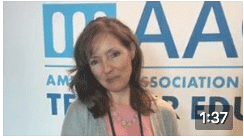
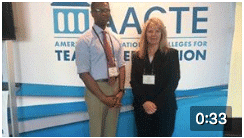
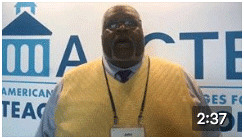
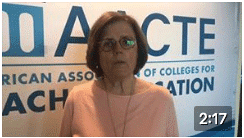
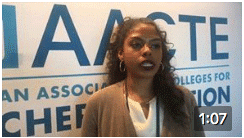
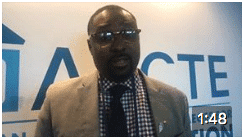

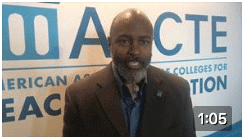

 In anticipation of Washington Week’s Day on the Hill, AACTE’s premier advocacy event, members of the Committee on Government Relations and Advocacy hosted a webinar on Thursday, April 18 to answer questions about the event. How to schedule a congressional meeting, how to develop an advocacy message, and how to walk into a U.S. Senator’s office with confidence, are just samples of the many issues discussed during the webinar. The recorded webinar, Are You Ready for a Day on the Hill? is now available to watch on the AACTE website.
In anticipation of Washington Week’s Day on the Hill, AACTE’s premier advocacy event, members of the Committee on Government Relations and Advocacy hosted a webinar on Thursday, April 18 to answer questions about the event. How to schedule a congressional meeting, how to develop an advocacy message, and how to walk into a U.S. Senator’s office with confidence, are just samples of the many issues discussed during the webinar. The recorded webinar, Are You Ready for a Day on the Hill? is now available to watch on the AACTE website. 

 As co-editors, we are seeking chapter authors for a book we are publishing with IGI Global for release in 2020 titled Handbook of Research on Leadership and Advocacy for Children and Families in Rural Poverty. This interdisciplinary book will address issues related to education, counseling, social work, public policy, health, and leadership.
As co-editors, we are seeking chapter authors for a book we are publishing with IGI Global for release in 2020 titled Handbook of Research on Leadership and Advocacy for Children and Families in Rural Poverty. This interdisciplinary book will address issues related to education, counseling, social work, public policy, health, and leadership.